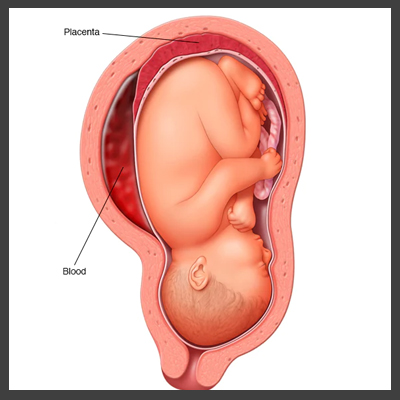

Placental abruption (abruption placentae) is an uncommon yet serious complication of pregnancy. The placenta develops in the uterus during pregnancy. It attaches to the wall of the uterus and supplies the baby with nutrients and oxygen.
Placental abruption occurs when the placenta partly or completely separates from the inner wall of the uterus before delivery. This can decrease or block the baby's supply of oxygen and nutrients and cause heavy bleeding in the mother.
Placental abruption often happens suddenly. Left untreated, it endangers both the mother and the baby.
Abdominal pain and back pain often begin suddenly. The amount of vaginal bleeding can vary greatly, and does not necessarily indicate how much of the placenta has separated from the uterus. It is possible for the blood to become trapped inside the uterus, so even with a severe placental abruption, there might be no visible bleeding.
In some cases, placental abruption develops slowly (chronic abruption), which can cause light, intermittent vaginal bleeding.Our baby might not grow as quickly as expected, and one might have low amniotic fluid or other complications.
The cause of placental abruption is often unknown. Possible causes include trauma or injury to the abdomen from an auto accident or fall, for example or rapid loss of the fluid that surrounds and cushions the baby in the uterus (amniotic fluid).
Factors that can increase the risk of placental abruption include:
Placental abruption can cause life-threatening problems for both mother and baby.
For the mother, placental abruption can lead to:
For the baby, placental abruption can lead to:
You can not prevent placental abruption, but one can decrease certain risk factors. For example, do not smoke or use illegal drugs, such as cocaine. If one have high blood pressure, work with our health care provider to monitor the condition.
Always wear our seatbelt when in a motor vehicle. If one have had abdominal trauma from an auto accident, fall or other injury seek immediate medical help.
If one have had a placental abruption, and one are planning another pregnancy, talk to our health care provider before one conceive to see if there are ways to reduce the risk of another abruption.